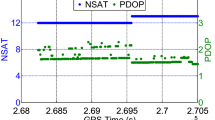Abstract
Carrier phase ambiguity resolution is the key to high-precision global navigation satellite system (GNSS) positioning and navigation. It applies to a great variety of current and future models of GPS, modernized GPS and Galileo. The so-called ‘fixed’ baseline estimator is known to be superior to its ‘float’ counterpart in the sense that its probability of being close to the unknown but true baseline is larger than that of the ‘float’ baseline, provided that the ambiguity success rate is sufficiently close to its maximum value of one. Although this is a strong result, the necessary condition on the success rate does not make it hold for all measurement scenarios. It is discussed whether or not it is possible to take advantage of the integer nature of the ambiguities so as to come up with a baseline estimator that is always superior to both its ‘float’ and its ‘fixed’ counterparts. It is shown that this is indeed possible, be it that the result comes at the price of having to use a weaker performance criterion. The main result of this work is a Gauss–Markov-like theorem which introduces a new minimum variance unbiased estimator that is always superior to the well-known best linear unbiased (BLU) estimator of the Gauss–Markov theorem. This result is made possible by introducing a new class of estimators. This class of integer equivariant estimators obeys the integer remove–restore principle and is shown to be larger than the class of integer estimators as well as larger than the class of linear unbiased estimators. The minimum variance unbiased estimator within this larger class is referred to as the best integer equivariant (BIE) estimator. The theory presented applies to any model of observation equations having both integer and real-valued parameters, as well as for any probability density function the data might have.
Similar content being viewed by others
Author information
Authors and Affiliations
Corresponding author
Additional information
Acknowledgements This contribution was finalized during the author’s stay, as a Tan Chin Tuan Professor, at the Nanyang Technological University’s GPS Centre (GPSC) in Singapore. The hospitality of the GPSC’s director Prof Law Choi Look and his colleagues is greatly appreciated.
Rights and permissions
About this article
Cite this article
Teunissen, P. Theory of integer equivariant estimation with application to GNSS. Journal of Geodesy 77, 402–410 (2003). https://doi.org/10.1007/s00190-003-0344-3
Received:
Accepted:
Issue Date:
DOI: https://doi.org/10.1007/s00190-003-0344-3




